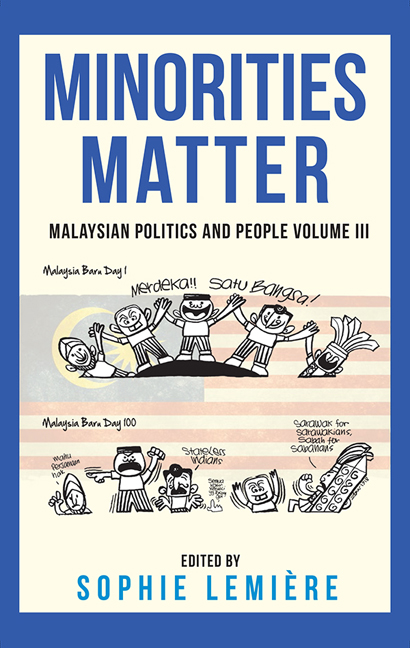Book contents
- Frontmatter
- Contents
- Acknowledgements
- Foreword
- Introduction
- Part I Engaging Politics: The Role of Minorities in GE14 and Beyond
- 1 Local Elections, Decentralisation, and Institutional Reform
- 2 ‘Where's Our #30peratus’: A Feminist Critical Discourse Analysis of Twitter Debates on Women's Political Representation
- 3 Romantic Whispers: When Relationships Mobilise Political Agency in the Sabah Elections
- 4 The Orang Asli in GE14: Towards Meaningful Political Engagement?
- 5 The 1963 Malaysia Agreement (MA63): Sabah and Sarawak and the Politics of Historical Grievances
- Part II Building Democracy: Malaysia Baru and the (Im-)possible Reform
- List of Contributors
4 - The Orang Asli in GE14: Towards Meaningful Political Engagement?
from Part I - Engaging Politics: The Role of Minorities in GE14 and Beyond
Published online by Cambridge University Press: 25 January 2020
- Frontmatter
- Contents
- Acknowledgements
- Foreword
- Introduction
- Part I Engaging Politics: The Role of Minorities in GE14 and Beyond
- 1 Local Elections, Decentralisation, and Institutional Reform
- 2 ‘Where's Our #30peratus’: A Feminist Critical Discourse Analysis of Twitter Debates on Women's Political Representation
- 3 Romantic Whispers: When Relationships Mobilise Political Agency in the Sabah Elections
- 4 The Orang Asli in GE14: Towards Meaningful Political Engagement?
- 5 The 1963 Malaysia Agreement (MA63): Sabah and Sarawak and the Politics of Historical Grievances
- Part II Building Democracy: Malaysia Baru and the (Im-)possible Reform
- List of Contributors
Summary
This chapter analyses the GE 14 campaign's interaction with the Orang Asli (indigenous people) and how the Orang Asli chose to vote. It will argue that such an exploration is important despite the fact that the Orang Asli constitute such a small percentage of the population, because they are often marginalised and deprived of political agency. Furthermore, the Orang Asli continued to vote primarily for the Barisan Nasional (BN) coalition despite significant concerns. In an election based on change, therefore, the Orang Asli represent a strong continuity.
Based on an ethnography of the political campaigns in the state of Pahang, this chapter argues there was a continued lack of engagement with the Orang Asli, due to both lack of willingness and resource constraints. Pakatan Harapan's (PH) campaigning was not successful because they did not engage effectively. Forgetting the names of the villages, talking down to attendees, repeating programmatic narratives, a shortage of gifts and resources, and emphasising differences all served to alienate the Orang Asli in attendance. Such problems meant that BN's vast rural machinery could not be countered. Since PH has formed the government there have been positive signs they are giving the Orang Asli greater consideration, but also indications that they are willing to use BN's former tools of political control which is limiting meaningful political engagement focused on bringing about change for the Orang Asli communities.
Introduction
In the recent historic Malaysian election, the anticipated ‘Malay tsunami’ instead became described as the ‘Malaysian tsunami’. As a Malaysiakini editorial noted, this ‘tide comprised not just the major ethnic groups in the peninsula – Malays, Chinese and Indians – but also those in Sabah and Sarawak’ (Malaysiakini, 2018a). There is one group, however, often described as forgotten – that of the peninsular Orang Asli (indigenous peoples). In an election that was dominated by a narrative for change, the Orang Asli represent a strong continuity. Gains were limited for Pakatan Harapan (PH) in areas with a high proportion of Orang Asli, despite acknowledgement that the support of the Orang Asli would be potentially decisive in areas where the rural Malay populations were expected to mostly side with Barisan Nasional (BN) or Parti Islam Se-Malaysia (PAS).
- Type
- Chapter
- Information
- Minorities MatterMalaysian Politics and People Volume III, pp. 52 - 73Publisher: ISEAS–Yusof Ishak InstitutePrint publication year: 2019



